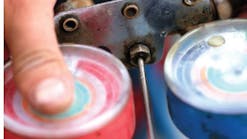The refrigerant industry is alive with activity. Whenever the economy gets back into gear, this corner of the HVACR world will be ready to shift into high.
This month's edition of Refrigerant 411 contains two items related to research into hydrocarbons. We know carbon dioxide is a promising alternative, but these organic compounds of hydrogen and carbon are being proclaimed by some as another answer to the constant phaseout of HFC refrigerants, such as R-22. A research project now ongoing is by A.S. Trust & Holdings. The goal is to determine how much energy can be saved by switching from R-22 to the hydrocarbon HCR188C2.
Follow Terry McIver at www.twitter.com/TerryMcIver
Tecumseh Products Company is taking hydrocarbons seriously. The company is moving forward to develop hydrocarbon-based compressors. Keith Gifford of Tecumseh says it's inevitable that hydrocarbons will become an alternative to HFCs.
But as long as we have HFCs such as R410A (a blend of HFC-32 and HFC-125), it's important that wise judgments be made about a refrigerant's inherent value, says James Walters, vice president of international affairs for the International Council of Air Conditioning, Refrigeration, and Heating Manufacturers' Association (ICARHMA). Walters says ICARHMA members are concerned that, in discussions over the merits of potential alternative refrigerants by industry and government, those refrigerants’ global warming potential (GWP) will receive the lion’s share of attention. A refrigerant's safety, performance, cost of use, and cost to the environment must all be considered, he says.
On the training front, Ritchie Engineering has opened Yellow Jacket University, for training related to refrigerant recovery.
Honeywell's Genetron® Performax™ LT refrigerant has obtained UL classification. Genetron Performax is an R-22 replacement.
Rapid Recovery, a refrigerant recovery company, has opened its 25th location, in Denver, CO, to further meet the refrigerant recovery and recycling needs of responsible contractors.
Without refrigerants, the HVACR industry as we know it would vanish. Thankfully, these and other companies are at work trying to find solutions to help contractors run their businesses more efficiently, and keep comfort systems running cooler, more economically, and, in the opinion of some, in a way that better protects the environment.







